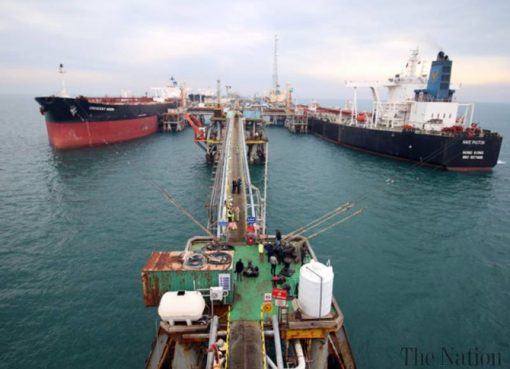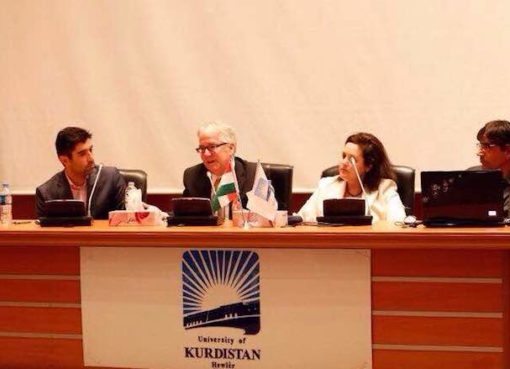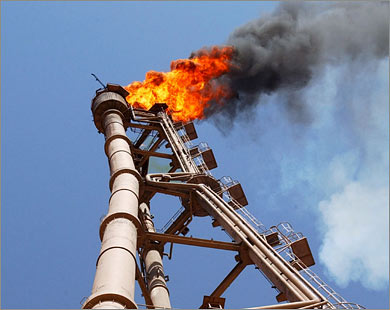
In oil-rich northern province of Kirkuk, stand-off remains over Baghdad’s March decision to suspend crude oil exports through Turkey.
Beirut – Iraq has maintained record crude oil export levels, registering 3.175 million barrels per day (bpd) in May and June, despite no crude oil exports from Kirkuk through the Turkish port of Ceyhan due to renewed political problems between the federal Iraqi government and the Kurdish Regional Government (KRG).
Iraqi crude oil exports averaged 1.895 million bpd in 2010, 2.167 million bpd in 2011, 2.426 million bpd in 2012, 2.402 million bpd in 2013 and 2.525 million bpd in 2014.
There have been no shortages of political challenges facing the Iraqi government of Prime Minister Haider al-Abadi. In April, he tried to push through a cabinet reshuffle. The move led to a parliamentary rebellion and protesters taking over the parliament building in the fortified Green Zone.
House Speaker Salim al-Jabouri was voted out but the Constitutional Court ruled the move illegal and reinstated him in his post. Oil Minister Adil Abul Mahdi submitted his resignation.
Abadi’s second challenge involved efforts to arrange a political détente with the KRG. The purpose of the reconciliation was to provide focus on his fights in Baghdad. There was no attempt to reach a new modus vivendi with the KRG on a broad reconciliation on oil exports or other disputed issues, including the amount of federal payments to the KRG.
The Kurds maintained that they have the authority and the right to appoint Kurdish ministers in the federal government. Very few substantive issues were seriously discussed between the parties and several disputes remain unresolved.
In the oil-rich northern province of Kirkuk, the stand-off remains over Baghdad’s March decision to suspend crude oil exports through Turkey, depriving the KRG of selling approximately 150,000 bpd of Kirkuk crude.
The KRG peshmerga militia has been in control of Kirkuk, defending the province against the threat of the Islamic State (ISIS). Baghdad’s move to suspend Kirkuk crude oil exports was in response to reports that the KRG was considering replacing senior National Oil Company staff with Kurds and to change the name of the firm to Kirkuk Oil Company. Baghdad was concerned the moves could be part of the KRG effort to annex the province.
The KRG remains in dire financial straits. The federal government has ceased paying the allotted 17% of the country’s oil revenue to it. The financial crisis persists despite the KRG exporting about 350,000 bpd of its own crude oil through its dedicated pipeline to Ceyhan and rising oil prices.
According to the KRG Ministry of Natural Resources May export report, the KRG allocated four cargoes of crude oil totalling 3.8 million barrels against existing May debts.
The KRG incurred much debt, paying salaries to its inflated civil service, the expenses of the Peshmerga and commitments to international companies operating in the Iraqi Kurdistan region.
Iraq’s major concern is its offensive against ISIS. The Iraqi Army, along with US air support and the al-Hashid al-Shabi, as well as local tribes are involved in the campaign.
In the past few months, the campaign drove ISIS forces from most of the western province of Anbar. A majority of the buildings in liberated cities have been destroyed. Thousands of people are homeless and in need of refuge within the country.
The government’s coffers are empty due to the oil price crash and massive corruption that took place during Prime Minister Nuri al-Maliki’s rule. It will take a long time and much money to rebuild the destroyed cities and take care of the refugees.
Abadi’s most important challenge is the military campaign to defeat ISIS in the northern Nineveh province, which has Iraq’s second-largest city of Mosul as its capital. A defeat of ISIS in Nineveh would deal a major blow to the jihadists’ presence in Iraq.
The problem is that ISIS continues to carry out suicide missions in major cities. Baghdad was hit by a suicide operation on July 4th, killing nearly 300 people.
How is Iraq able to sustain increasing oil exports? The country’s major producing oil fields are in the Shia-dominated south. ISIS has not been able to extend its influence south of Baghdad.
There have been anti-government demonstrations in the south, because of poor public services, corruption and lack of development but that discontent is local in nature and has not spilled into the oil industry.
International oil companies operating in the giant southern fields provided incremental production increases. Iraqi authorities increased export capacities from southern facilities. Basra crude has been segregated into Basra Light and Basra Heavy crudes, attracting more buyers and providing more incentive for the purchase of Iraqi crude.
(*) Walid Khadduri is an Iraqi Energy Expert and former Editor in Chief of the MEES
Source: The Arab Weekly. 2016/07/17 Issue: 64 Page: 21
http://www.thearabweekly.com/?id=5771







Comment here